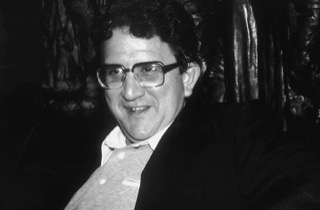1.
Between the cat and the house
there is an incline full of people
looking like harlequins
who want to move in a field of action
too far from my reach;
as the sun is already setting
they blur and become tangled
on the branches of the maple tree.
They’ve been there all autumn,
some of them leaning against the stone wall,
others on the roof of the garage,
alert as roosters.
I remain motionless.
I call them actors
taken from my stage sets
or, if you prefer, from my fictions.
2.
I write in Princeton
in a house on Markham Road.
The cat I refer to is a siamese
who goes up the steps to the back door
every day, sniffs around and eats
but never enters.
When it is very cold he takes shelter
in the tall grass,
waiting for the door to open.
3.
Between the cat and the door
between shelter and orphanhood
between the eyes of any animal
between dreams and despair
between one language and the other
between a country lost and another yet to appear,
I remain motionless, stalking.
Then I open my eyes
and outside what I see
are the eyes of the cat.
First: be an optimist.
Second: be well-dressed, cautious, obedient
(having passed all the athletic tests).
Finally, move on
as every member does:
one step forward, two
or three back
but always applauding.
Protect yourself from the waffling ones
because one day they will learn what it is they do
not want.
Protect yourself from the speakers of nonsense,
from Juan-the-Stutterer and Pedro-the-Mute,
because one day they will discover their strong
voice.
Protect yourself from the timid ones and those
you beat down
because some day they will no longer stand up
when you enter.
Permission to translate has been granted by Herederos de Heberto Padilla. Translation copyright to Pablo Medina.
Heberto Padilla is widely known as one of the most influential Cuban poets of the revolutionary period. Winner of the 1968 poetry prize from the Union of Writers and Artists of Cuba for his controversial book Fuera del juego (Out of the Game), Padilla fell out of grace with the Cuban authorities for writing poetry critical of the revolution. In 1971 he was arrested, tortured, and forced to make a Stalinist-style public confession before a gathering of the Union of Writers and Artists of Cuba. From then on his work was banned on the island. Finally, in 1981, as a result of enormous international pressure on the Castro regime, he was allowed to emigrate to the United States. He died in 2000 in Auburn, Alabama.


Pablo Medina was born in Havana, Cuba, and grew up in New York City. He is the author of twenty published works, including poetry, fiction, works in translation, and a memoir. His most recent book is The Foreigner’s Song: New and Selected Poems. He has taught at a number of American colleges and universities and now lives in Williamsville, Vermont.
“Our idea in calling this the ‘Translator’s Page’ is to show the ways and/or languages in which a translator works. Monthly posts may include translations from different languages and styles and centuries. The connective thread between them is the ability of the translator to interpret cultures and time periods for the contemporary reader.”
—Jonathan Wells, curator of The Translator’s Page